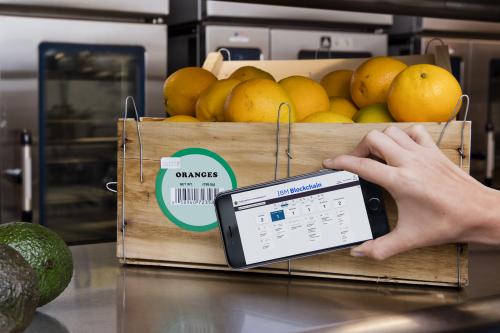IBM Blockchain
Improving Confidence in Food Safety with IBM Blockchain
 |
September 5, 2017 | Written by: Brigid McDermott
The spinach on the grocery store shelf is bright green and looks delicious, but how do you know it is actually safe for you to eat? What if your retailer could see and validate with certainty where that spinach was grown, handled, stored and inspected, as well as every stop it made on its journey to the store? This is information your retailer can have access to with a shared, distributed ledger technology called blockchain. Blockchain-based solutions have the potential to transform the food industry by directly connecting growers, processors, distributors, suppliers, retailers and regulators with a shared, immutable view of their transaction history.
Challenges of the food supply chain
While the globalization of food production and trade has opened up access to food and increased consumer options, it’s also made the supply chain longer and more complex. The journey from farm to fork has become less transparent. Even when growers, suppliers and retailers are fully committed to implementing strong food safety measures, this increasing lack of transparency can make it difficult to quickly diagnose and address issues, including initiating recalls if they are needed.
It can be difficult to locate the cause of a problem because participants in the food supply chain usually keep their own records (some in more detail than others) and are only required at most to share “one up, one down.” These records are frequently paper-based and vulnerable to inaccurate updating. When an issue occurs, inadequate track and trace capabilities may cause investigation delays that can be costly. If an origination point can’t be identified, a particular type of food could be completely banned from store shelves when only a single batch was affected and needed to be pulled. Regulators, growers, processors, distributors, suppliers, retailers and consumers would all benefit if delay and waste could be reduced.
Transforming the food supply chain with blockchain
If farm origination details, batch numbers, processing data, expiration dates and shipping details can be digitally recorded on blockchain, it may become possible to verify the history, location and status of a food product. This end-to-end traceability would improve transparency and efficiency throughout the food supply chain. For example, a retailer becomes aware of an issue with some of the spinach on its shelves. If the condition of that spinach was digitally recorded on the blockchain during its journey from farm to fork, network participants could view the entire history of that spinach to quickly triangulate on the root of the problem. If necessary, a selective recall of spinach from that specific batch could then be executed in an efficient manner.
Solving the challenges in the food industry will require participants in the food supply chain to work together. Recently announced, IBM’s collaboration with food suppliers and retailers such as Dole, Driscoll’s, Golden State Foods, Kroger, McCormick and Company, McLane Company, Nestlé, Tyson Foods, Unilever and Walmart brings together players across the food supply chain to tackle challenges that can result from a lack of transparency. The food safety collaboration will enable network participants to exchange data across a immutable network built on blockchain technology for enhanced visibility and accountability throughout the food supply chain.
Accelerating the future of food safety
Food is a huge, multi-trillion-dollar industry, so implementing a blockchain-based food safety system across the industry won’t happen in a single day. However, the food industry could change faster than you might expect. By focusing on shared value and leveraging insight from collaborators to address different types of needs among various constituents, we can drive adoption to reach critical mass.
We are also able to greatly accelerate the activation of this solution because of the new IBM Blockchain Platform, which is a fully enterprise-ready blockchain platform designed to accelerate the development, governance and operation of business networks. The platform offers a development sandbox and interactive playground to convert business designs into code, democratic governance and management tools to speed the formation and growth of multi-organization networks, and helps enable you to deploy and scale those networks with the necessary security and performance.
Blockchain is already beginning to improve the amount of collaboration, trust and transparency across the food industry, and over time will increase the traceability and safety of food products. Connect with IBM Blockchain and our ecosystem to explore how you can disrupt your industry.